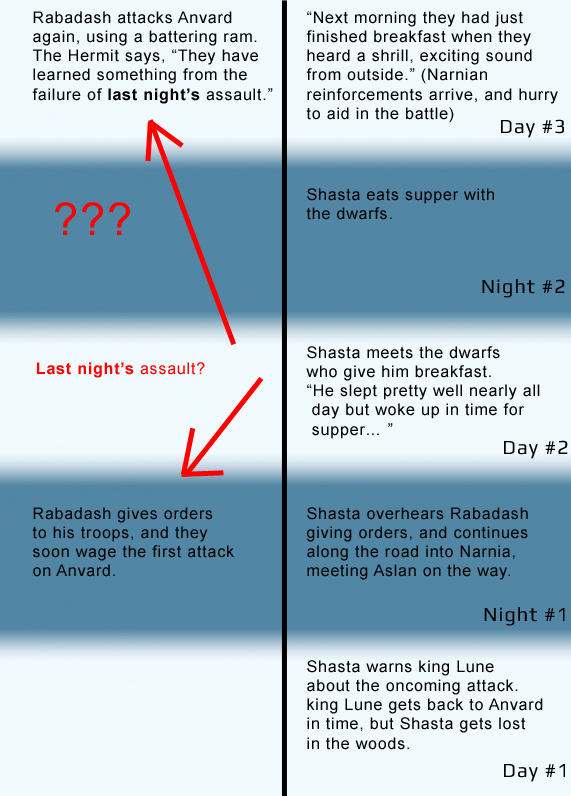In The Chronicles of Narnia: The Horse and His Boy, there seems to be a discrepancy in the timing of events.
After Shasta has given the warning to king Lune, he falls behind as their hunting party returns to the castle Anvard. Shasta then gets lost in the woods. At a fork in the road, he observes prince Rabadash giving orders to his troops. Rabadash says, “Attend, all of you. We are now within a furlong of the castle. Remember your orders. Once we are in Narnia, as we should be by sunrise….” This seems pretty clear that Rabadash attacked the castle Anvard later that night.
During that night, Shasta continues along the road hoping to find someone who can help him. He runs into Aslan along that road. Once Aslan leaves, it is early in the morning - and Shasta runs into some dwarfs. They give him breakfast. (This would have been the morning after Rabadash attacked Anvard). Shasta went outside with the drwafs, and sits down. They try telling him about Narnia, but Shashta falls asleep. “He slept pretty well nearly all day but woke up in time for supper" This short passage creates the entire problem. "Next morning they had just finished breakfast when they heard a shrill, exciting sound from outside.” This was the sound of the Narnian reinforcements arriving to help defend Anvard. Later this day, they arrive and turn the tide of battle, defeating Rabadash.
But when the hermit is looking in the pool and recounting the events of the battle (he basically narrates the battle to the reader) he says:
Ah – I see now what Rabadash and his men have been so busy at all day. They have felled and lopped a great tree and they are now coming out of the wood carrying it as a ram. They have learned something from the failure of last night’s assault. He would have been wiser if he had set his men to making ladders: but it takes too long and he is impatient. Fool that he is! He ought to have ridden back to Tashbaan as soon as the first attack failed, for his whole plan depended on speed and surprise.
The hermit seems to suggest that this was the second attack. That Rabadash's first attack was only the night before - but this would have been the night after Shasta's rest and not the night after Shasta warns king Lune.
I made a diagram showing the events that happened on each day/night, in case that description didn't make sense.
The only thing I can conclude is either the hermit was mistaken, or Rabadash made a second attack that is not recorded - and then the attack where the Narnian reinforcements arrive to help defend Anvard was actually during Rabadash's third attack.
Were either of these the case, or did something else happen that would make all of this make sense?

